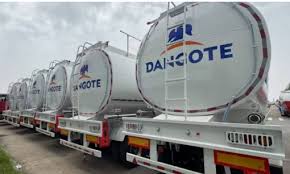The Natural Oil & Gas Suppliers Association of Nigeria (NOGASA) has threatened to suspend its operations if Dangote Refinery proceeds with its planned direct distribution of petroleum products to end users, bypassing traditional suppliers and depots. The association said the move could destabilise the sector, threaten thousands of jobs, and upend established business models in the country’s oil and gas value chain.
President of NOGASA, Benneth Korie, raised the alarm on Monday, insisting that the association will convene a general meeting on July 31, 2025, in Abuja to decide on the next line of action. Among the options being considered is a nationwide shutdown of their operations as a form of protest against the Dangote Refinery’s planned supply model.
“We are holding a general meeting on the 31st to decide whether to down tools. We must find a way to ensure that Dangote supplies products to us, the suppliers, and we in turn supply to the end users. These are chains of distribution,” Korie declared.
Dangote Refinery had announced in June 2025 that it would commence direct sales of Premium Motor Spirit (PMS) and diesel to end users from August 15, 2025. As part of this plan, the refinery intends to deploy 4,000 Compressed Natural Gas (CNG)-powered tankers to distribute fuel nationwide. The products will go directly to marketers, petrol stations, telecom operators, manufacturing firms, aviation companies, and other large consumers.
NOGASA members, who function as intermediaries between refineries and final consumers, view this development as a threat to their livelihoods. Korie noted that Dangote’s model of supplying companies like MTN, hotels, and other major players directly, risks making NOGASA suppliers obsolete.
“This is the new trend in the oil and gas industry where Dangote is supplying products directly to end users. If this continues, a lot of jobs are at stake and we are kicking against it,” Korie said.
He warned that bypassing suppliers would render thousands of jobs redundant, particularly drivers, logistics staff, and truck owners who currently form part of the established distribution chain.
“It will remove jobs from a lot of our members, and some of our staff will be redundant. Some of our trucks will also be redundant,” Korie lamented.
NOGASA’s planned meeting will deliberate on strategies to safeguard members’ interests. The association is expected to consider whether to suspend operations entirely and engage Dangote Refinery directly to negotiate a more inclusive distribution framework.
The group is advocating for a supply arrangement where Dangote would distribute products to NOGASA members, who will then supply end users as part of the traditional supply chain. Korie emphasised that eliminating suppliers from the equation would harm not just the sector, but the wider economy.
He stated, “What Dangote is trying to do is not healthy for the oil and gas industry. This supply chain needs to be maintained for the stability of the sector and the economy.”
The unfolding situation highlights the broader tensions in Nigeria’s oil and gas market, especially as the private sector begins to take more dominant roles following the commencement of production by the multi-billion dollar Dangote Refinery.
Observers warn that while direct supply may increase efficiency and reduce consumer prices, it also risks displacing thousands of middlemen and workers whose livelihoods depend on the traditional supply system.
The outcome of NOGASA’s July 31 meeting could signal the next phase of the standoff between Nigeria’s largest private refinery and key players in the oil products supply chain.
